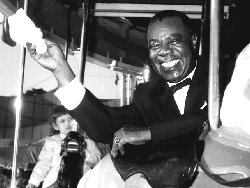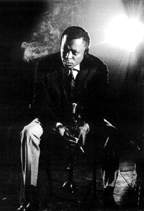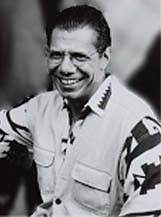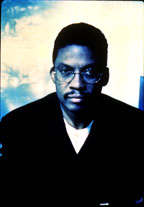|
HEAVYWEIGHT BOXING
 In January, Blue
Note Records turns 60 years old and they'd like you to celebrate.
If you rush to one of those big online record stores (I forget which
one—Tower?
Amazon?
CDNow?),
you can buy "The
Blue Note Years," a spanking-new 14-CD, 149-song, beautifully
packaged boxed set surveying the label's history, for a mere $232.99,
down from $239.99. "You save $7!" announces the website and, yes,
the exclamation point is theirs.
In January, Blue
Note Records turns 60 years old and they'd like you to celebrate.
If you rush to one of those big online record stores (I forget which
one—Tower?
Amazon?
CDNow?),
you can buy "The
Blue Note Years," a spanking-new 14-CD, 149-song, beautifully
packaged boxed set surveying the label's history, for a mere $232.99,
down from $239.99. "You save $7!" announces the website and, yes,
the exclamation point is theirs.
Boxed sets used to seem like a good idea. A four-CD package
of the best of James
Brown or Ray Charles,
for example, is a good idea. But a 14-CD survey of a jazz label
whose strongest period ended 30 years ago? Who is the intended
audience for this behemoth? Most jazz fans already own the cream
of Blue Note's classic recordings—Monk, Shorter, Rollins,
Blakey, Hancock—and if they don't, $232.99 can buy a large
bucket of it. For a pop label that mainly marketed singles—Stax,
say, or Motown—a
label survey can be just the ticket, but are there Blue Note fans
so dedicated that they want a survey that includes a teaspoon
of everything from Sidney
Bechet to Holly Cole
singing "The Hum Drum Blues?"
The whole boxed set issue raises two important questions: Why
the hell are these things so expensive? And who really listens
to them once they get home? You're supposed to save money buying
in bulk (which is why this single guy who lives in the East Village
now buys 12-roll cubes of toilet paper at K-Mart),
but, with boxed sets, you usually pay more per disc. What's up
with that? CDs are way overpriced to begin with (they cost a buck
or two to make, inclusive of everything)—shouldn't you get
a break buying 14 CDs of back catalogue material, even with those
fancy-schmancy booklets?
And, admit it, you rarely listen to your boxed sets. You're sitting
home and you want to hear some Miles.
You've got a stack of Miles filed under "D," but you really want
to hear some of the good stuff in that boxed set that's up on
the top shelf. That means taking it down, finding the album you
want to hear within the box (it might be split up on two discs
and require detective work within the booklet to find), and putting
it on. You give up, step to "D," and slip out the lesser Miles.
 Which brings us to "Bitches
Brew," once a perfectly good double-LP—90 important,
influential minutes of music. "Bitches Brew" has just been released
in a four-CD, blue metal box with a trove of outtakes and later
material never intended for "Bitches Brew"—some previously
unissued, some culled from other Miles compilations—swelling
the album to 265 minutes. A lot of it is great stuff but, in the
future, what will be "Bitches Brew"—the hour and a half Miles
intended for us to have, or the four-plus hours the CD Era has
made possible? It's like a director's cut in film but, in Miles'
case, the director isn't around to do the cutting. One thing they
didn't do to this bloated "Brew" is the dreaded chronological-order
processing, largely thanks to the early boxed-set sniping of Village
Voice jazz critic Gary Giddins.
Which brings us to "Bitches
Brew," once a perfectly good double-LP—90 important,
influential minutes of music. "Bitches Brew" has just been released
in a four-CD, blue metal box with a trove of outtakes and later
material never intended for "Bitches Brew"—some previously
unissued, some culled from other Miles compilations—swelling
the album to 265 minutes. A lot of it is great stuff but, in the
future, what will be "Bitches Brew"—the hour and a half Miles
intended for us to have, or the four-plus hours the CD Era has
made possible? It's like a director's cut in film but, in Miles'
case, the director isn't around to do the cutting. One thing they
didn't do to this bloated "Brew" is the dreaded chronological-order
processing, largely thanks to the early boxed-set sniping of Village
Voice jazz critic Gary Giddins.
Albums are, well, albums—put together by creative minds
for a reason. Modern-day savants who think it makes some kind
of sense to take apart albums carefully constructed by an artist
and producer (especially a brilliant, hands-on producer like Blue
Note's Alfred
Lion) and present the music IN THE ORDER IN WHICH IT WAS RECORDED
are crackers. I've been at recording sessions where the musicians
weren't up to a particularly tricky tempo, so they recorded an
entire afternoon of ballads. They didn't expect you to sit through
six ballads in a row. Ask anybody who argues for chronological
order whether they'd like, oh, "Sgt.
Pepper's Lonely Hearts Club Band" reissued in recorded order.
Or Glenn Gould's Bach
concertos. Or a Hemingway
novel.
Recording artists also didn't intend for you to listen to outtakes,
but outtakes have become de rigueur on jazz boxed sets. The interesting
thing about outtakes is that they usually were left off the original
albums for a good reason. Hundreds of alternate takes have been
released during the CD Era, but how many of them are superior
to the takes originally chosen? I'm happy to have them, but sometimes
they make me feel odd, like I'm looking through somebody's trash.
ATTENTION CURRENT RECORDING ARTISTS: BURN YOUR OUTTAKES!
 Since boxed sets are so popular—and since people are willing to pay more to buy in bulk—it was just a matter of time before a contemporary artist decided to jump directly onto the bandwagon. Chick Corea was so enamored of his new band Origin and the week at the Blue Note that produced a "Live at the Blue Note" CD earlier this year, he decided to give us the six-CD "A Week at the Blue Note" a few months later. If you liked the songs on the first CD, you'll love this—some of them are repeated four times. It's a dangerous precedent, but, hey, why not? I'm waiting for the artist who debuts with a fat, expensive box.
Since boxed sets are so popular—and since people are willing to pay more to buy in bulk—it was just a matter of time before a contemporary artist decided to jump directly onto the bandwagon. Chick Corea was so enamored of his new band Origin and the week at the Blue Note that produced a "Live at the Blue Note" CD earlier this year, he decided to give us the six-CD "A Week at the Blue Note" a few months later. If you liked the songs on the first CD, you'll love this—some of them are repeated four times. It's a dangerous precedent, but, hey, why not? I'm waiting for the artist who debuts with a fat, expensive box.
 Of the recent boxed sets, the most essential is "John
Coltrane: The Classic Quartet-Complete Impulse! Studio Recordings."
It's an eight-CD set, but there are more than a dozen albums piled
in there. Chances are, though, most jazz fans have most of this.
"Herbie Hancock:
The Complete Blue Note '60s Sessions" inflates seven real
good albums—studded with classic performances—with extra
stuff, but it only adds up to a total of six discs. Chances are,
most jazz fans have a lot of this, too.
Of the recent boxed sets, the most essential is "John
Coltrane: The Classic Quartet-Complete Impulse! Studio Recordings."
It's an eight-CD set, but there are more than a dozen albums piled
in there. Chances are, though, most jazz fans have most of this.
"Herbie Hancock:
The Complete Blue Note '60s Sessions" inflates seven real
good albums—studded with classic performances—with extra
stuff, but it only adds up to a total of six discs. Chances are,
most jazz fans have a lot of this, too.
Two real good, slightly left-of-center, and relatively affordable
boxed sets are the four-CD "Charlie
Parker: The Complete Live Performances on Savoy" and the three-CD
"Louis
Armstrong: An American Icon." The first is self-explanatory—live
Bird is great Bird; you can feel his presence in ways you can't
on the studio recordings. The second is unusual because, rather
than gathering the important early Armstrong,
this is the popular Armstrong—the guy whose songs are being
covered by all those lame neo-swing
bands; the guy who recorded "Blueberry Hill," "Hello Dolly," and
"It's a Wonderful World"; the guy who, besides being the most
important jazz musician of all time, was a stupendous entertainer.
It may not be essential, but it's (shhh!) fun. Of course, if you
feel this is all too much for you, you can always buy the Diana
Krall Christmas
CD. It's only three songs long.
|

